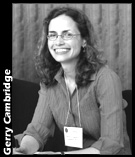Catherine Tufariello
was born in Ithaca, New York, in 1963. Raised in Amherst, near Buffalo, she received her B.A. in English from The State University of New York at Buffalo, and a Ph.D. from Cornell University, with a doctoral thesis on the poetry of Dickinson and Whitman.
Her two poetry chapbooks, Annunciations (Aralia Press) and Free Time (Robert L. Barth), both appeared in 2001. Keeping My Name, her first full-length collection (Texas Tech University Press, 2004), won both the Walt McDonald First-Book Award in Poetry and The Poets’ Prize. Among her publication credits are The Hudson Review, Poetry, and anthologies such as The New Penguin Book of Love Poetry and Western Wind.
Catherine lives with her husband and daughter in Valparaiso, Indiana, where she is a staff member at the Project on Civic Reflection at Valparaiso University.
—Back to Milestones Contents—
|
Bête Noire
It blocked her path in the first bad dream
She could make me understand—
Tall and shaggy, with three dog paws
And a little human hand,
Unseen until—here she looked at hers,
Describing in the air
A gesture of menace, or warning, or welcome.
Either it ended there,
Or else she didn’t have the words
To say more, at not quite three.
It held out its hand, she said again.
It held out its hand to me.
I rocked her and sang, assuring her
With a mother’s instinctive guile
That dreams weren’t real and couldn’t hurt her,
Knowing all the while
That when she slept, the tick-tick-tick-
Tock of its stumbling tread
Would shadow me familiarly
And lie down beside my bed—
Accosting me with its rheumy eyes,
Its smell of damp defeat,
Its matted fur aseethe with fleas,
Its breath like rotten meat,
Its pitiful, imperious
Howl like an infant’s, and,
Most appallingly of all,
Its apprehending hand.
[Originally published in Poetry]

Artist’s Statement
T
his poem describes a nightmare my daughter had that recurred several times in the year she was three. During that period she was terrified of dogs. For me the dream was also disturbing, a confrontation with the limits of my power to protect her—not only from external threats but from fears and demons she might inherit (or already have inherited) from me, and from the terror of death at the heart of being human.
The experience of writing “Bête Noire” underscored for me the mysterious power of form. For about a year and a half, I tried repeatedly to get the dream down in a poem. But the drafts, all in iambic pentameter—in one version the poem was a sonnet—were melodramatic and overwritten. Tinkering with them was getting me nowhere, and finally I gave up. The following spring, rereading some of Auden’s ballads, I suddenly thought of having another go at the poem in that form. As soon as I picked it up again, I knew this was the shape it was meant to take. Apart from the last line—I went through about fifty adjectives before settling on “apprehending”—the revision almost wrote itself. That old folk form, the ballad, was well suited to convey the gothic and surreal atmosphere of nightmare.
This is a fairly recent poem, so it’s a little soon to say that it represents a turning point. But it did involve a formal breakthrough, one that allowed me to approach a subject I’d been struggling with since becoming a mother.
|


